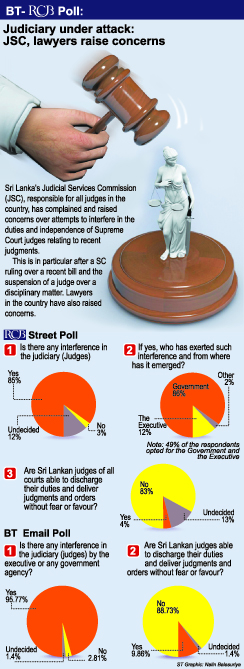BT-RCB poll: City and rural folk differ on education issues
View(s):Diverse views, interestingly, emerged in the BT-RCB joint email-cum-street poll on education issues conducted this week, just as the struggle by university teachers over wages appeared to be resolved.
While 93 per cent of those polled by email by the BT (Business Times) said there was a major crisis in education, just 58 per cent of those asked in the street poll by Research Consultancy Bureau (RCB) were on the opinion that a crisis prevails.
Another 31 per cent, in the RCB poll conducted in two urban areas in Colombo, said there was ‘no major crisis’ in education.
But there was unanimity on one suggestion: Call for an all party conference with civil society participation to review the education system and recommend changes.
With education facing many issues – university lecturers on strike, delay in A’ level question paper markings, demand for more budget allocation for education and errors in the June A’ level question papers, the BT and the RCB sought the views of the people on education.
More than 1000 respondents were polled by RCB while 400 responded to the BT poll.
Respondents were asked whether “education in Sri Lanka is facing its worst crisis’ and if so who is responsible – the state, private sector or civil society.
On the question of what can be done, they were asked: “Should the ministers be changed, wages of university lectures increased and/or appoint an All Party Conference with civil society participation to study and recommend a new education system.”
Most email respondents blamed the government for the crisis while views of the man-on-the-street slightly differed, with some blaming university teachers and even the media (for creating a crisis out of nothing).
The somewhat contradictory views from professionals and other urban settlers through email, and the working class (those who use public transport, and housewives) is a reflection of two groups of people thinking differently on national issues, a sociologist said. “This poll shows that sometimes urban concerns may not be rural concerns,” he said.
Follow @timesonlinelk
comments powered by Disqus





















